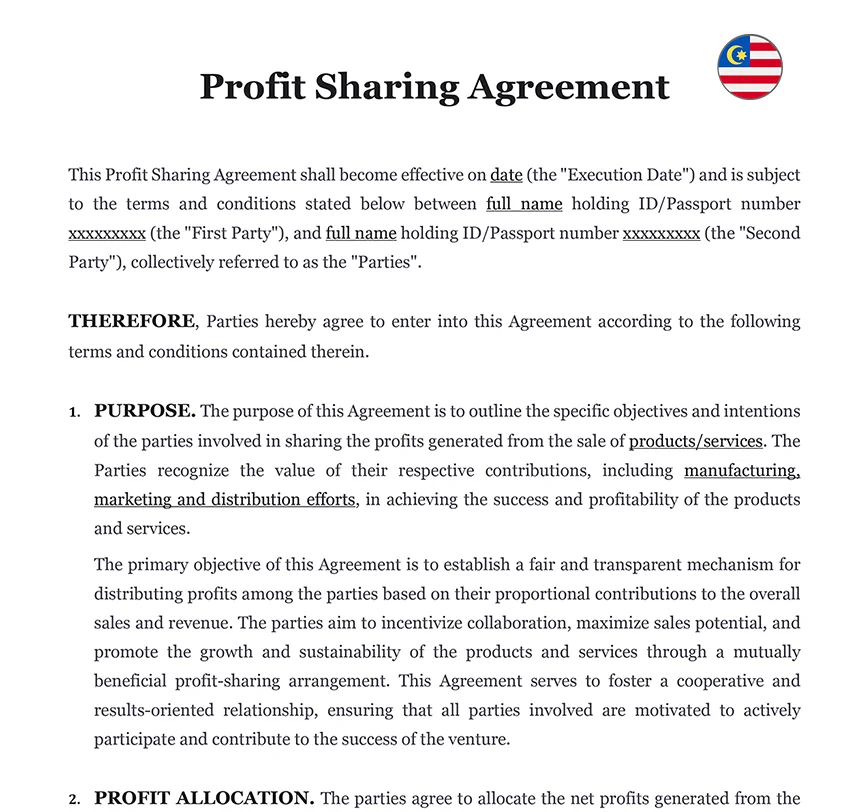Ready to use legal template
Drafted by experienced lawyers
Compliant with Hong Kong law
Ready to use legal template
Drafted by lawyers
Compliant with Hong Kong law
Home › Business contracts › Profit Sharing Agreement
Learn more about Profit Sharing Agreement in Hong Kong
A Profit Sharing Agreement is a legally binding contract that outlines how profits generated by a business or project will be distributed among its partners, shareholders, or employees. This agreement ensures transparency, defines each party’s entitlements, and helps prevent disputes by clearly setting out the terms of profit allocation. In Hong Kong, profit-sharing arrangements are commonly used in partnerships, joint ventures, and incentive schemes, aligning financial rewards with contributions to the business’s success. Whether you are structuring a new business collaboration or rewarding key employees, having a well-drafted agreement is essential for protecting all parties’ interests while complying with Hong Kong law. Download our expertly drafted Profit Sharing Agreement, easy to edit in Word format, designed to be used in Hong Kong and tailored to meet your business needs.
Table of contents
-
What is a Profit Sharing Agreement in Hong Kong?
-
What is included in this Profit Sharing Agreement?
-
Can a Profit Sharing Agreement be used for SMEs?
-
How do you calculate profit distribution?
-
How are taxes handled in a Profit Sharing Agreement?
-
What are the tax implications of a Revenue Sharing Agreement?
-
What happens if the business incurs losses?
-
Can a Profit Sharing Agreement be modified after signing?
-
How do you terminate a Profit Sharing Agreement?
What is a Profit Sharing Agreement in Hong Kong?
A Profit Sharing Agreement in Hong Kong is a legal contract between two or more parties who agree to share the net profits of a business or project. According to the Companies Registry, this type of business agreement is widely used in partnerships, joint ventures, or collaborations where clarity on profit entitlement is essential. between two or more parties who agree to share the net profits of a business or project. These agreements are commonly used in partnerships, joint ventures, or collaborations where profit distribution needs to reflect the contributions or roles of each participant. In the Hong Kong legal environment, such agreements provide transparency, help manage expectations, and support business relationships by clearly defining each party’s financial entitlements.
What is included in this Profit Sharing Agreement?
A well-drafted Profit Sharing Agreement in Hong Kong includes the following key clauses:
| ➤ Purpose: Clarifies the objective of the agreement and outlines the scope of the business activity or venture. |
| ➤ Profit Allocation: Describes how net profits will be calculated and distributed, often expressed as a percentage per party. |
| ➤ Costs and Expenses: Details which expenses are deductible before profits are calculated and how reimbursement will be handled. |
| ➤ Taxation: Each party is independently responsible for paying their taxes in accordance with Hong Kong’s Inland Revenue Ordinance, which governs profits tax and individual tax obligations., including profits tax. |
| ➤ Termination: Defines how the agreement can be ended, such as through mutual consent, breach, or project completion. |
| ➤ Confidentiality: Ensures sensitive financial or business information is protected, both during and after the agreement. |
| ➤ Dispute Resolution: Specifies that any disputes will first be addressed through negotiation and then, if unresolved, through mediation or arbitration via the Hong Kong International Arbitration Centre (HKIAC). |
| ➤ Entire Agreement: Confirms that the contract reflects the full understanding between the parties and overrides any previous agreements. |
| ➤ Governing Law and Jurisdiction: Establishes that the agreement is governed by the laws of Hong Kong. |




